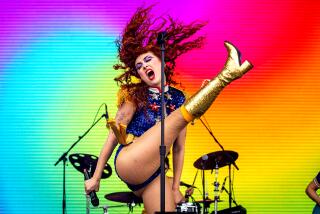Showdown in Desert
INDIO — “Tonight, I’m a rock ‘n’ roll star,” Oasis’ Liam Gallagher sang in the closing minutes of the third Coachella Valley Music and Arts Festival here Sunday, and you couldn’t help but marvel at the difference between this and the first time you heard him sing the line.
In the English group’s debut album eight years ago, Gallagher, 21 at the time, injected “Rock ‘n’ Roll Star” with the celebration and defiance of a young man vowing to triumph over everyone and everything that had made him feel inferior.
It’s a frequent rock ‘n’ roll theme, but Oasis expressed it with uncommon power in that album, “Definitely Maybe,” thanks to the conviction in Gallagher’s voice, some of the most glorious melodic hooks since Lennon-McCartney and a guitar-driven propulsion that echoed the optimism of the album’s biggest hit, “Live Forever.”
On Sunday, however, there was little of that captivating self-assurance. Rather than a battle cry, Gallagher’s vocal seemed simply workmanlike, perhaps betraying the sense of struggle surrounding the band, which badly needs to rebuild critical and commercial credibility after years of off-putting behavior and a severely disappointing 2000 album, “Standing on the Shoulders of Giants.”
Amid the warm, relaxed vibe at the 80-acre Empire Polo Field on a gorgeous spring day, Oasis’ performance was a reminder that several of the main-stage bands had a lot at stake. Perception is nearly everything in the pop world, and Oasis and two other groups were taking the stage Sunday at crucial points in their careers.
The Prodigy, the British techno-rock wonder of the mid-’90s, was battling to prove that it still deserves a place in the rock hierarchy after almost five years of silence. And newcomers the Strokes needed to assert that they warrant all the talk about their being key members of rock’s budding renaissance.
Even the Coachella festival itself was on trial. After two promising but inconclusive stagings and one year off, the ambitious affair needed to prove that it deserves to be an annual fixture on the Southern California concert scene.
Of the four question marks, only the festival deserved an unqualified rave. The event, which drew an estimated 55,000 fans to see some 60 acts over two days, was marred Saturday by massive traffic delays in this desert city 125 miles east of L.A., but otherwise it was a superbly satisfying experience.
Echoing the spirit of European rock festivals, Coachella sidesteps mundane hit-makers in favor of a cutting-edge lineup that reflects many of the strongest currents in today’s rock and electronic fields.
The favorable buzz even lured some European festival organizers Sunday to see if they could pick up ideas. There were also lots of hotshot agents and managers checking out talent.
Given the taste-maker nature of the fans drawn to the classy lineup, the buzz--pro or con--from a performance here can be enormous. One beneficiary this year is likely to be Mars Volta, an explosive rock band led by some former members of At the Drive-In.
Of the three main-stage headliners, the Strokes got the first chance to generate some favorable word of mouth. The group, which took the stage around 5 p.m. in the sunshine, is one reason there is so much talk about a return of passion and imagination in a rock scene dominated for years by one-dimensional and flyweight acts.
One problem with the Strokes on their debut album, “Is This It,” is that it takes the return to rock passion and excitement too literally. The music and look draw heavily from a series of earlier New York rock sources, none more obvious than Lou Reed and the Velvet Underground.
Though some of the songs on the album capture the darkly seductive, world-weary spirit of those works, the Strokes’ set might have been more striking to young fans if the band had cut out the middleman and just started playing such Reed/Velvet songs as “Walk on the Wild Side” and “Waiting for the Man.”
With growth as songwriters and a touch more charisma for lead singer Julian Casablanca, the Strokes could contribute to the looming rock upswing. To think of them as leaders of the pack, however, seems a stretch.
After a fast-paced set by the Foo Fighters that was brightened by a guest stint from singer-actor Jack Black, the Prodigy took the main stage around 8:15 p.m. to begin its campaign to recapture the momentum it had in 1997, thanks to its inspired blend of techno power and rock-show imagery.
The key to that original breakthrough was “Firestarter,” a display of techno-rock energy so marvelous that leader Liam Howlett has spent years trying to figure out a suitable follow-up. He may finally have one in “Nuclear,” another explosive piece that highlighted the Prodigy’s hourlong set.
But one track may not be enough, especially at a time when new energy is in the air. The remaining new material felt lumbering or overly familiar, and the old stuff sounded dated.
Keith Flint, one of the band’s two vocalists, played the Johnny Rotten rock-rebel role well in the “Firestarter” days but seemed as unconvincing Sunday as Rotten himself was on the Sex Pistols’ reunion tour. And, yes, the band did play a tough, defiant version of its controversial “Smack My Bitch Up,” suggesting that it could care less about concerns over the song’s title. (The group maintains that the phrase means to achieve maximum energy and doesn’t refer specifically to women.)
Oasis took the stage just before 10 p.m. and never quite caught fire, chiefly because there was simply no winning new material. “The Hindu Times,” the band’s new single, summarized a lot of what was once appealing about this band, but it seemed recycled, and “Force of Nature” showed little of Oasis’ most endearing touches.
The new album is due in July and it may have some wonders on it, but they weren’t evident Sunday. As they moved in workmanlike fashion toward the end of the set with “Rock ‘n’ Roll Star,” the song seemed like a melancholy reflection rather than a battle cry.
Of the other rock acts sampled in Coachella’s other three tents and stages, the standout was Mars Volta. Led by former At the Drive-In singer Cedric Bixler and guitarist Omar Rodriguez, the group put on a galvanizing set that lived up to the spirit of their former band’s physical and sonic attack. Mars Volta plays with a windshield-shattering force and puts its faith in the visceral power of music to be liberating.
On a night on which you came away from Coachella worrying about the future of some old favorites, the weekend provided an electrifying new favorite.
More to Read
The biggest entertainment stories
Get our big stories about Hollywood, film, television, music, arts, culture and more right in your inbox as soon as they publish.
You may occasionally receive promotional content from the Los Angeles Times.










